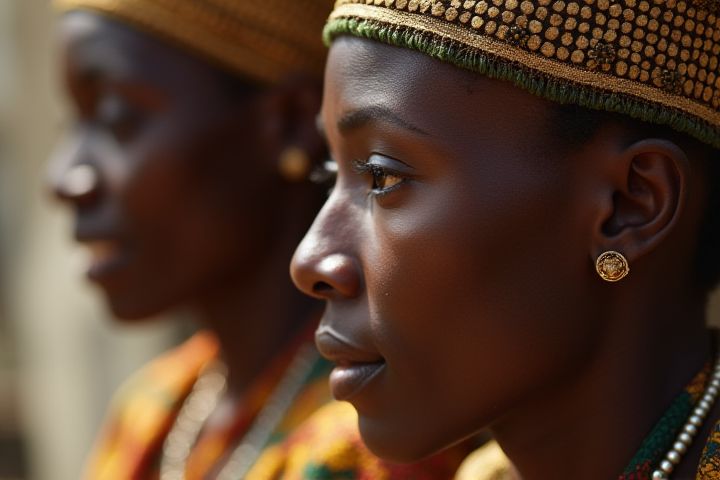
Nigeria is one of the most religiously diverse countries in the world, with significant populations of Christians, Muslims, and practitioners of indigenous African religions. Approximately half of the population identifies as Muslim, primarily concentrated in the northern regions, while around 40% are Christians, mostly found in the southern and central parts. The practice of religion plays a crucial role in the everyday lives of Nigerians, influencing social norms, political dynamics, and cultural celebrations. Interactions between different religious groups can sometimes lead to tensions, but they also provide opportunities for interfaith dialogue and collaboration. Understanding Nigeria's complex religious landscape is essential for anyone looking to engage with its rich cultural and social fabric.
Diverse religious landscape
Nigeria showcases a diverse religious landscape, predominantly characterized by Christianity and Islam, which coexist alongside various indigenous belief systems. Approximately half of the population adheres to Islam, primarily in the northern regions, while Christianity is most prevalent in the southern and central areas. This rich tapestry of faiths fosters a vibrant cultural identity but also leads to complex interfaith dynamics and occasional tensions. Understanding this diversity is crucial for appreciating Nigeria's societal structure and its influence on political, social, and economic spheres.
Predominantly Christian South
Nigeria's religious landscape is marked by a significant divide, with the predominantly Christian South encompassing diverse denominations, such as Catholicism, Pentecostalism, and Anglicanism. This region is known for vibrant church activities and social engagement, reflecting the cultural integration of faith in daily life. Major cities, including Lagos and Port Harcourt, showcase a blend of modernity and tradition within their religious practices. Your understanding of the role of religion in societal dynamics can be enhanced by exploring how these communities navigate faith in contemporary issues.
Predominantly Muslim North
Nigeria features a complex religious landscape, with Islam predominantly practiced in the northern regions, where the majority of the population identifies as Muslim. This northern area is marked by rich cultural traditions that intertwine with Islamic practices, influencing daily life, governance, and community structures. In contrast, the southern regions predominantly embrace Christianity, leading to a dynamic interplay between different faiths across the country. Understanding this religious divide is essential for grasping Nigeria's socio-political nuances and its impact on national unity.
Indigenous beliefs exist
Nigeria is home to a rich tapestry of Indigenous beliefs, which coexist alongside major religions like Christianity and Islam. Various ethnic groups maintain traditional spiritual practices, often centered around ancestor worship, divination, and connection to nature. Rituals and festivals play an essential role in preserving these beliefs, fostering community, and passing down cultural heritage. You may find that many Nigerians actively blend Indigenous practices with their religious observances, creating a unique spiritual landscape that reflects the nation's diversity.
Religious freedom principles
Nigeria is home to a diverse tapestry of religious beliefs, primarily Islam and Christianity, reflecting its rich cultural heritage. The nation's constitution guarantees freedom of religion, allowing individuals to practice their faith without discrimination. However, challenges arise from sectarian violence and regional disparities, emphasizing the need for ongoing dialogue and understanding among various religious groups. Promoting interfaith initiatives can enhance tolerance, fostering a more harmonious society where everyone can enjoy their religious liberties.
Significant religious festivals
Nigeria is home to a diverse array of religious beliefs, with Islam and Christianity as the two dominant faiths. Significant religious festivals such as Eid al-Fitr and Eid al-Adha celebrate the end of Ramadan and commemorate the willingness of Ibrahim to sacrifice his son, respectively, showcasing the rich traditions of the Muslim community. Meanwhile, Christmas and Easter hold immense importance for Christians, marking the birth and resurrection of Jesus Christ, often celebrated with colorful parades and communal feasting. Your understanding of these festivals can provide insight into Nigeria's cultural tapestry and the deep-rooted spiritual practices that unite its people.
Influence in politics
Nigeria's religious landscape significantly influences its political dynamics, with Islam and Christianity being the dominant faiths. The intertwining of religion and politics often manifests in electoral campaigns, policy-making, and governance, where candidates frequently align themselves with religious groups to gain support. This alignment can lead to sectarian tensions, as diverse religious beliefs impact voter behavior and loyalty across different regions. Understanding this intricate relationship is crucial for grasping the complexities of Nigeria's political environment and the challenges it faces in achieving national unity.
Role in community life
Nigeria's diverse religious landscape significantly influences community life, with Islam and Christianity being the predominant faiths. Places of worship often serve as critical social hubs, fostering communal bonds through shared values and collective activities. Religious organizations provide essential support systems, offering education, healthcare, and charity, which enhance social welfare in various regions. Your understanding of local customs and religious practices can deepen your appreciation of Nigeria's rich cultural tapestry.
Interfaith dialogue efforts
Nigeria's rich cultural diversity is reflected in its vibrant religious landscape, comprising mainly Islam and Christianity, along with traditional African beliefs. Interfaith dialogue efforts are increasingly essential for promoting peace and coexistence amidst the nation's ongoing religious tensions. Initiatives by community leaders and organizations aim to foster understanding and collaboration between different faith groups, addressing misconceptions and building trust. Engaging in these dialogues can help you appreciate the importance of tolerance and unity in a multi-religious society.
Religious tensions exist
Nigeria is a country marked by significant religious diversity, with Islam and Christianity being the two predominant faiths. This religious landscape has led to various tensions, particularly in regions where these groups coexist, such as the Middle Belt and northern areas. Disputes often arise over issues like land, governance, and cultural identity, exacerbating existing societal divides. Understanding these dynamics is essential for fostering peace and dialogue among Nigeria's diverse communities.
